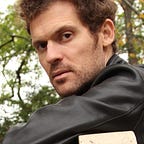Born Like This
Categorized in: Arts reviews
Dina speaks to you. Her eyes flit about your face. They wander over the top of your head, as if she were looking for signs of whatever information is unspoken. As if she wanted to take in more than what’s coming at her, seeking nuance and the indirect.
If you watch her long enough, you understand that she’s clearly most comfortable onstage — playing — just her and the instrument and the music. And if it’s a duo, during interludes in the playing of the violin, when it’s the piano’s turn, she looks almost lost again. Impatient, but controlling the impatience. Her right arm extends, made to look impossibly long by the bow growing from it, to touch the hem of her dress. It’s almost as if she didn’t know what to do with herself during these moments. But, of course, that’s not the case at all. She knows the piece as well as it can be known. The interludes are integral parts of it, and yet she can’t wait to play. As if she felt satisfied and fully in her element only when she’s playing.
And her playing is quietly phenomenal — nothing less than that. There is tremendous calm in the ordered quality of it — in the titanium of the scales containing the dragon, in the solidity of the mountain holding back the volcano. Almost paradoxically, except for certain movements of the body necessary to reach a note or to extract and project a particular sound, her playing doesn’t call attention to itself. She never showboats, although plenty of violinists do, the instrument’s repertoire giving them plenty of opportunity to do so.
Her feeling for structure is more so an artist’s than an architect’s — an earned trait. Her technique is simplicity. Her fire is incandescent. In short, there is complete, utterly ingrained, entirely organic control — of attack, placement, speed, pitch, dynamics. I wouldn’t be surprised if Dina were that much of a sound whisperer that she could tell the sonic waves at what velocity and angle to bounce off the walls of any given hall she plays. It’s the sort of control only possible to achieve in zigzags: master your innate musicality, temper it with technique, swing over into greater musicality still, then add the control necessary to play the most difficult pieces; after a few years, tilt back into an embrace of nuance, and finally unify the two in the sort of simplicity that lives beyond complexity — what artists and philosophers and yogis strive for their entire lives. Nobody has it in the cradle, but some people are born with a feeling for the steps, a facility for taking the hairpin turns at speed.
To put it perhaps a bit Romantically, but in a manner no less unshrinking than her interpretation of each composer’s design: Dina is born to play that fickle, impossible, curved cabinet of aged wood held together by ancient tree sap and lacquer, made anxious and more than occasionally neurotic by high-strung catgut and the shrieking emotions of composers who were just as often mentally unstable as they were staggeringly talented. Her reason for being is to control this creature — and to do it onstage: anew every time, with the possibility of failure every time, of a slipped fingertip, of misplaced micro-attention, yet getting it right every time, with control that is decades beyond technique and miles beyond the virtuosic. And yet, human. Every time.
And lest it go unmentioned — because her playing, so powerful and sure and gently relentless, floods you with emotion that often overtakes the intellect — the way Dina Nesterenko plays, just as it is with all great — yes, great — performers, is one of the most compelling things you’re likely to experience anytime soon. Yes, it compels you. With the force majeure of its nuance, its control, its breadth of vision, it forces you to become a huge ear, to listen, to be transfixed, transported, transformed, and finally — to hear.
Go and listen to Dina play. You’ll never hear music the same way again.
